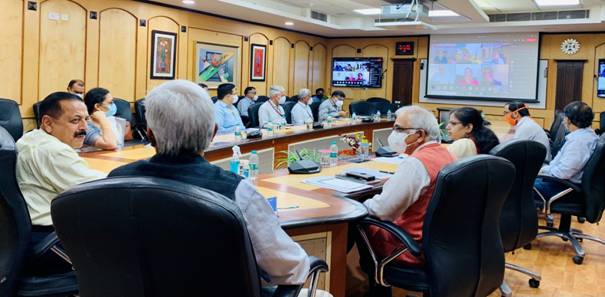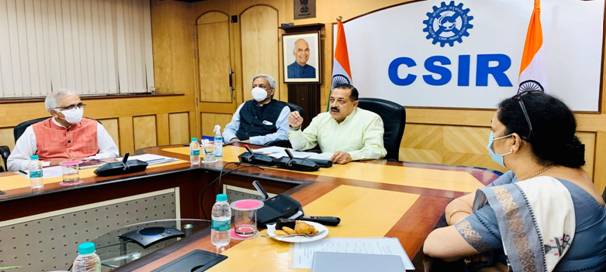Jammu & Kashmir Heralds ‘Purple Revolution’ in the Country, taking a lead in the Lavender Cultivation: Dr. Jitendra Singh
CSIR has Visible Footprints in Jammu & Kashmir and the Northeast of the Country, which are Priority Areas for the Government
Union Minister Dr. Jitendra Singh Delivers Keynote Address at the “Azadi Ka Amrit Mahotsav” Event
Union Minister of State (Independent Charge) Science & Technology; Minister of State (Independent Charge) Earth Sciences; MoS PMO, Personnel, Public Grievances, Pensions, Atomic Energy and Space, Dr Jitendra Singh today said that Jammu & Kashmir heralds the ‘Purple Revolution’ of India by taking a lead in the lavender cultivation in almost all the 20 districts of the Union Territory. In particular, the districts of Kathua, Udhampur, Doda, Ramban, Kishtwar, Rajouri, Srinagar, Pulwama, Kupwara, Bandipora, Budgam, Ganderbal, Anantnag, Kulgam and Baramulla have made a huge headway in this direction, he observed.
Delivering keynote address at the Special Webinar on Council of Scientific and Industrial Research (CSIR) Aroma Mission on the eve of India’s 75th Independence Day, Dr Jitendra Singh said that the Council of Scientific and Industrial Research (CSIR) has visible footprints in Jammu & Kashmir and Northeast, both being the priority areas of the Modi Government.


The Minister said that on the eve of India’s 75th Independence Day, this webinar is dedicated to the farmers of the country as well as to Prime Minister Narendra Modi’s resolve of doubling farmers’ income. He said that the CSIR’s Aroma Mission is generating new avenues of self-livelihood and entrepreneurship.
India is a vast country and its different parts / regions have similar resources, said Dr Jitendra Singh, which should be used by all stakeholders to everyone’s benefit. The Minister suggested holding a conference at the national capital to share the best practices from across the country. He also floated the idea of having inter-ministerial committees with various Ministries, such as, Agriculture, DoNER, Education and Health & Family Welfare as its constituents.
Terming the new-age farmers as ‘Agri-Technocrats’, Dr. Jitendra Singh observed that the Aroma Mission of the CSIR has generated rural employment of farmers, spurred entrepreneurship in aromatic oils and other aromatic products manufacturing, and lowered the import of essential and aromatic oils. Today, with CSIR’s Aroma Mission, important medicinal and aromatic plants are being cultivated in 6,000 hectares of land. The Mission has generated 10 to 12 lakh man-days of rural employment and more than 500 tonnes of essential oil worth Rs.60 crores was produced during the last two years.
During the meeting, Dr Jitendra Singh also engaged in a virtual interaction with farmers engaged in aroma mission through CSIR from across the country, including Doda in Jammu & Kashmir, Assam in Northeast, Shirdi in Maharashtra, Barabankvi in Uttar Pradesh and Mandi in Himachal Pradesh.
The webinar was also addressed by Dr Sanjay Kumar, Director, CSIR-Institute of Himalayan Bioresource Technology (CSIR-IHBT) detailing the Aroma Mission. Dr Ranjana Aggarwal, Director, CSIR-National Institute of Science Communication and Policy Research (CSIR-NIScPR) delved deeper into the socio-economic impact of the Mission accomplishments. Prof. Virendra Kumar Vijay, Professor, Indian Institute of Technology, Delhi spoke on transforming rural livelihood through Science & Technology interventions.
The highlight of the programme was the participation of the Aroma Mission beneficiaries, such as the farmers who shared their experiences and thanked the CSIR for lending a helping hand.
*****

 हिंदी
हिंदी





